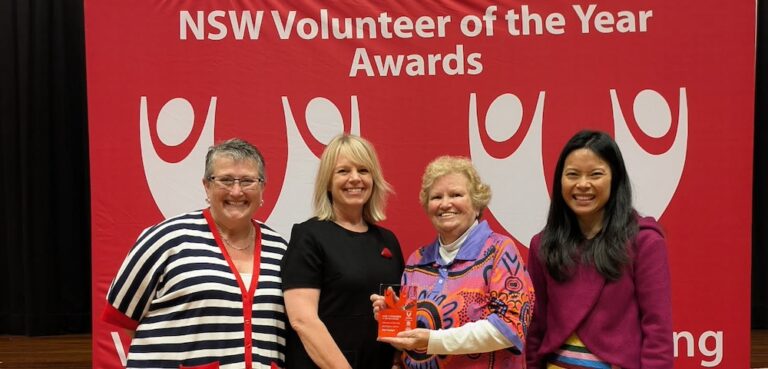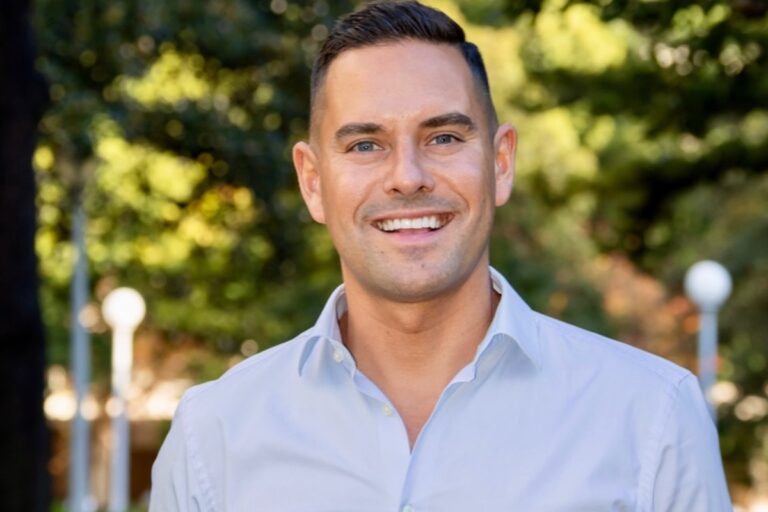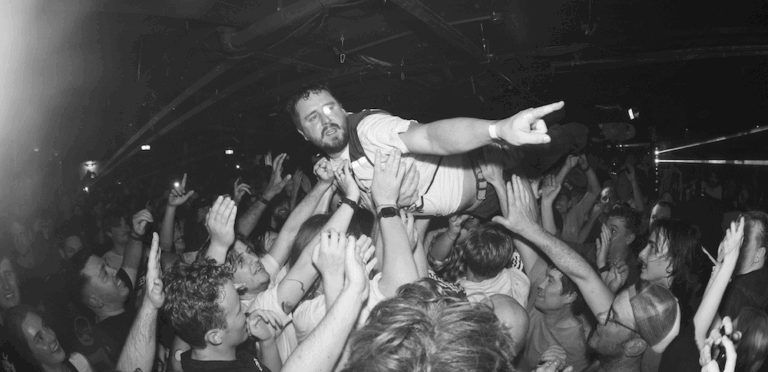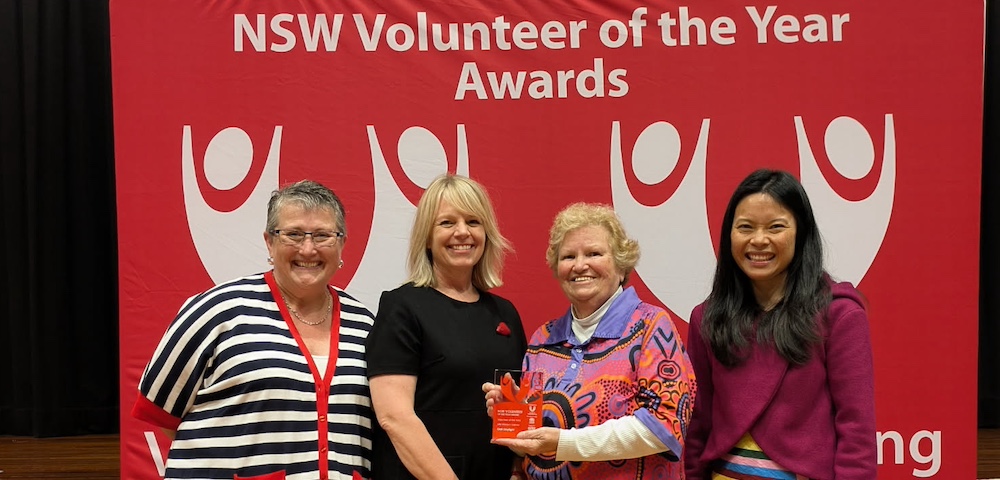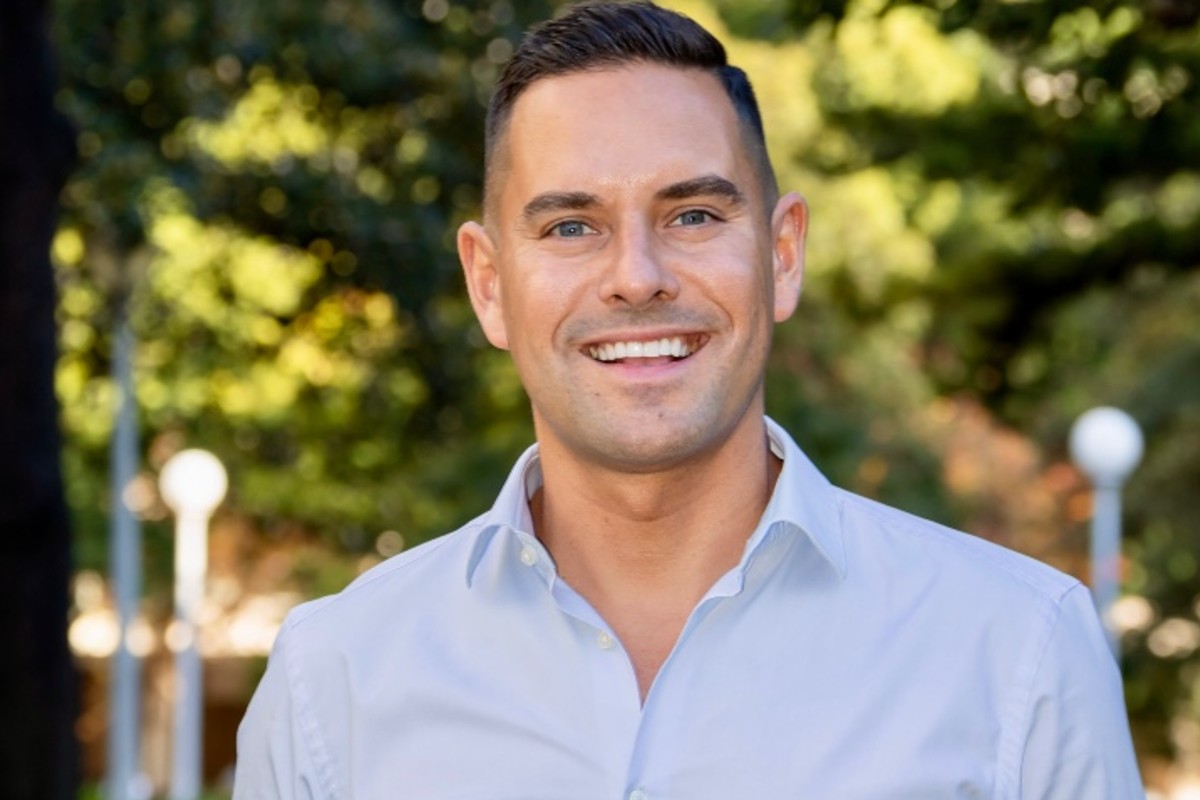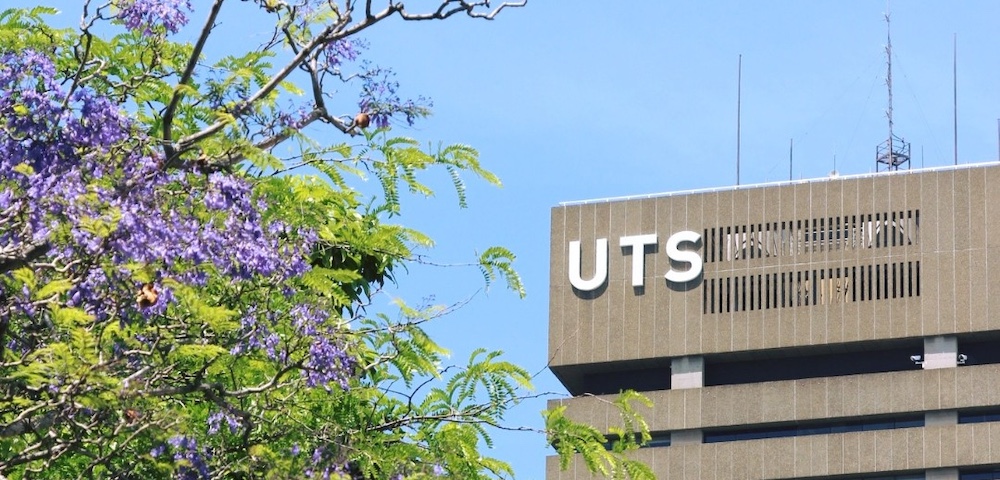
Sydney’s quiet battlers: The grassroots mutual aid groups feeding the city
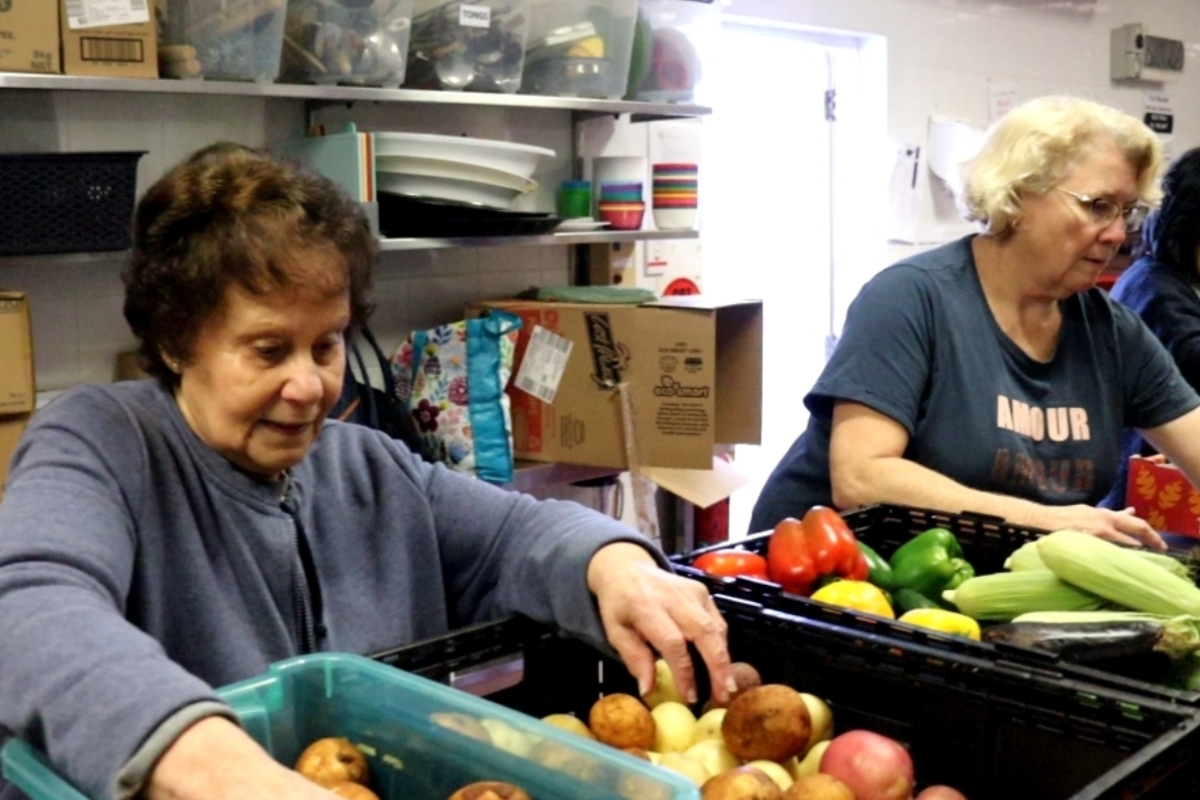
By ROBBIE MASON
“In a nutshell, we get no government support at all,” says Rik Johnson from Streetheart.
Inspired by his previous involvement with the Kings Cross Bikers Social and Welfare Club, Rik Johnson, a motorcycle enthusiast, established the mutual aid organisation Streetheart almost four years ago to help Sydney’s homeless community.
When Streetheart first began, Rik zigzagged across the city solo on his motorbike with bulging saddle bags – an angelic hell-raiser distributing material items to the city’s homeless. The organisation, which is entirely volunteer-run, has since expanded, developing a presence in Bathurst and Queensland. In Sydney, demand following the COVID-19 pandemic has skyrocketed.
“Let’s just say it’s gone from a motorbike to a big van,” Rik tells City Hub.
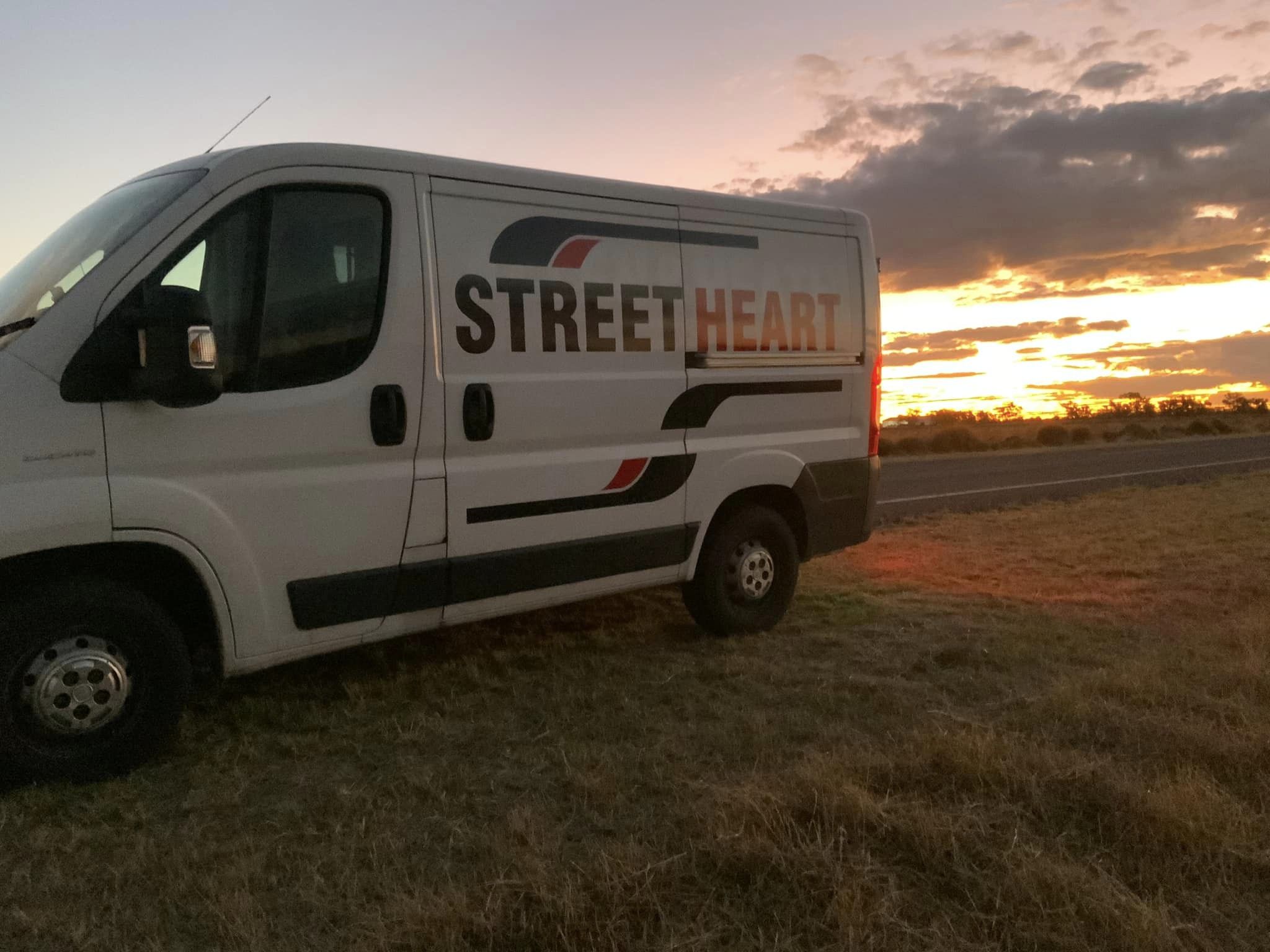
Amid the media discourse on stretched non-profit organisations and the local council debates surrounding food relief in this era of rising living costs, there’s a gaping hole, a seeming void that has escaped the attention of those charged with supporting anti-poverty measures.
Volunteer-run grassroots mutual aid organisations in Sydney have long provided unconditional support to those in need. But that support is akin to shadow work; they still struggle to garner council funding.
Local councils in Sydney have recently expressed interest in furnishing food relief programs with additional support. During the last City of Sydney Council meeting on 26 June, Lord Mayor Clover Moore put forward a motion noting that demand for food relief organisations has soared to a higher level than during the COVID-19 pandemic. She requested the Council investigate options for providing financial support to food relief programs. The motion passed unanimously.
At a meeting on 20 June, the Inner West Council, meanwhile, shot down a proposal for the council to provide $50,000 in direct funding to anti-poverty organisations and food relief programs such as those run by Addison Road Community Organisation and Bill Crews Exodus Foundation. The Council resolved to hold a fundraiser instead.
But grassroots anti-poverty activists and food relief organisers, who feel ignored, have hit back.
Kristen O’Connell from the Antipoverty Centre suggests that council food relief support, while well-intentioned, still requires fine-tuning.
“It’s good they’re providing some money to these services but there are problems and inadequacies with those services,” Kristen says.
Barriers to access Kristen cites included cost, shame, stigma, paternalism and a lack of knowledge that some food relief programs even exist.
Regarding the direction of funding – the specifics of which neither the City of Sydney Council nor Inner West Council has outlined – Kristen expresses a note of caution.
“If we’re going to be providing direct funding to food relief organisations, we need to require that funding is not used for conditional or means-tested programs,” she says.
“People should not have to produce paperwork to prove their eligibility to access these services. The most important indicator of whether someone needs support is when they seek that support. The fact that someone turns up to a food bank should be enough to show that they need access to it.”
Consider the organisations Cr Lockie and Cr Griffiths proposed to support. The Addi Road Food Pantry charges for the food it provides, albeit at a much-reduced cost. The Bills Crews Foundations, meanwhile, is a religious organisation, founded by Reverend Bill Crews, a Uniting Church minister, although one who is by no means a cardboard cut-out of religious orthodoxy.
They are certainly worthy recipients of council aid, but what about groups that have no conditional requirements of access whatsoever?
Food relief services overrun
Every Friday, Streetheart gives food and material support to the two dozen or so rough-sleepers – the number fluctuates – at Wentworth Park in Glebe. Rik also collects and drops off basic necessities to those in need throughout the week. He estimates that the grassroots operation provide help to 40 or 50 people per week. When Streetheart was serving food at Martin Place, they were helping over 100 people. But they didn’t have the resources to keep up with demand there, nor at Parramatta.
It’s hard to keep up when homeless numbers are surging. According to the City of Sydney’s latest street count, in February this year 277 people were sleeping rough in the inner city local government area (LGA), while a further 272 were in crisis and temporary accommodation beds. It’s a larger number than the previous year’s investigation.
Streetheart receives help from a few local charities, such as Sydney Food Share, and the general public who donate money, food, clothes, blankets and furniture.
“We got a local cafe that drops off freshly made rolls and sandwiches,” Rik explains. “We’re like a little tight knit community.”
Rasmus Petersen, a volunteer with the Sydney chapter of Food Not Bombs, who serve free food from a street kitchen every Thursday outside Newtown Station, also specifies that demand for food relief has soared in the last few months.
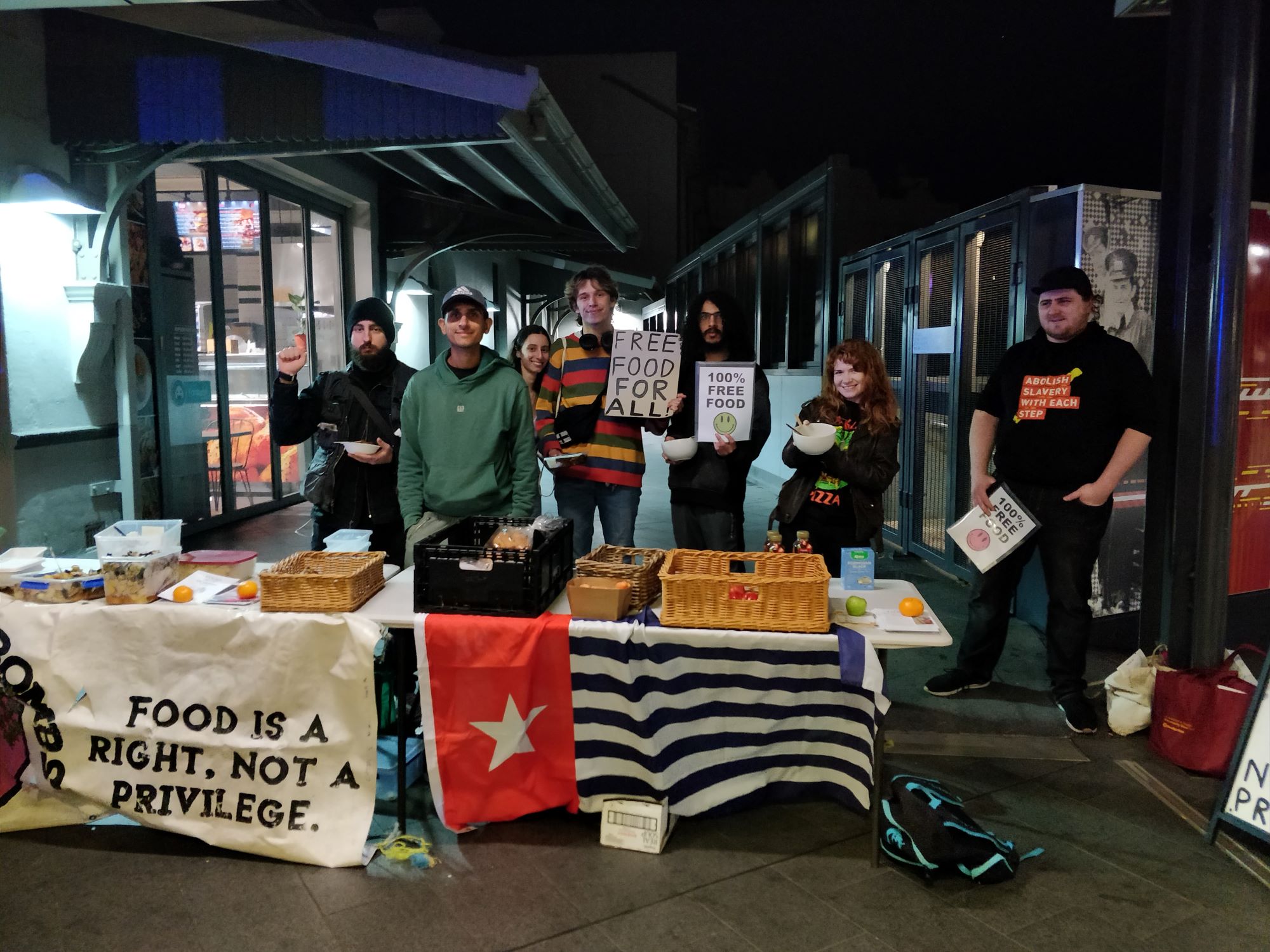
Describing the rise in living costs as “a double edged sword”, Rasmus explains that Food Not Bombs has seen a simultaneous “huge increase” in people taking food and volunteering with the group.
“Some of us attribute that partly to the fact that we are more established and people know where we are at. But then there’s also the fact that we now have had for some time, every single Thursday, a queue at the very start, which we didn’t used to have.”
“In the past, we had trouble sometimes getting rid of all our food… Now we feel like we’re not making enough food,” Rasmus continues.
Alison Leader, who works for the People’s Pantry, an initiative of the non-profit organisation South Eastern Community Connect (SECC), tells a similar story.
“COVID was bad,” she says, “but this year it’s much worse.”
Demand for basic necessities like food has “grown exponentially” since the COVID-19 pandemic, Alison says. Around 132 households currently access the food relief centre in Mascot – the vast majority on a weekly basis.
“20 percent of that number are young families, often with women who have been in domestic violence situations or are dealing with single parenthood and starting all over again. They’re struggling with the rising costs of living.”
Between June 2022 and June 2023, demand for food from the People’s Pantry has grown 150 percent. It’s a familiar story across the non-profit sector. The flocks of people demanding aid today dwarf the numbers witnessed during the COVID era.
While OzHarvest was serving 1500 people at Waterloo Market during the pandemic, this number has now ballooned to 2000. For First Nations Response, an Aboriginal-controlled organisation, requests for help have doubled since late 2022. At Addison Road’s Camperdown Food Pantry, food demand has risen 32 percent over the last year. The list goes on.
Alisons from SECC says, “we’ve really had to rationalise and ration how much we’re giving to people and limit it to the south-east Sydney LGAs [local government areas]… We can’t give it to everybody. We just don’t have enough.”
SECC CEO Kate Melphot emphasises the difficulty of meeting current demand, stating that their drop-in food service “runs out of pantry items regularly. This is the climate of south east Sydney at the moment, and it’s time to act.”
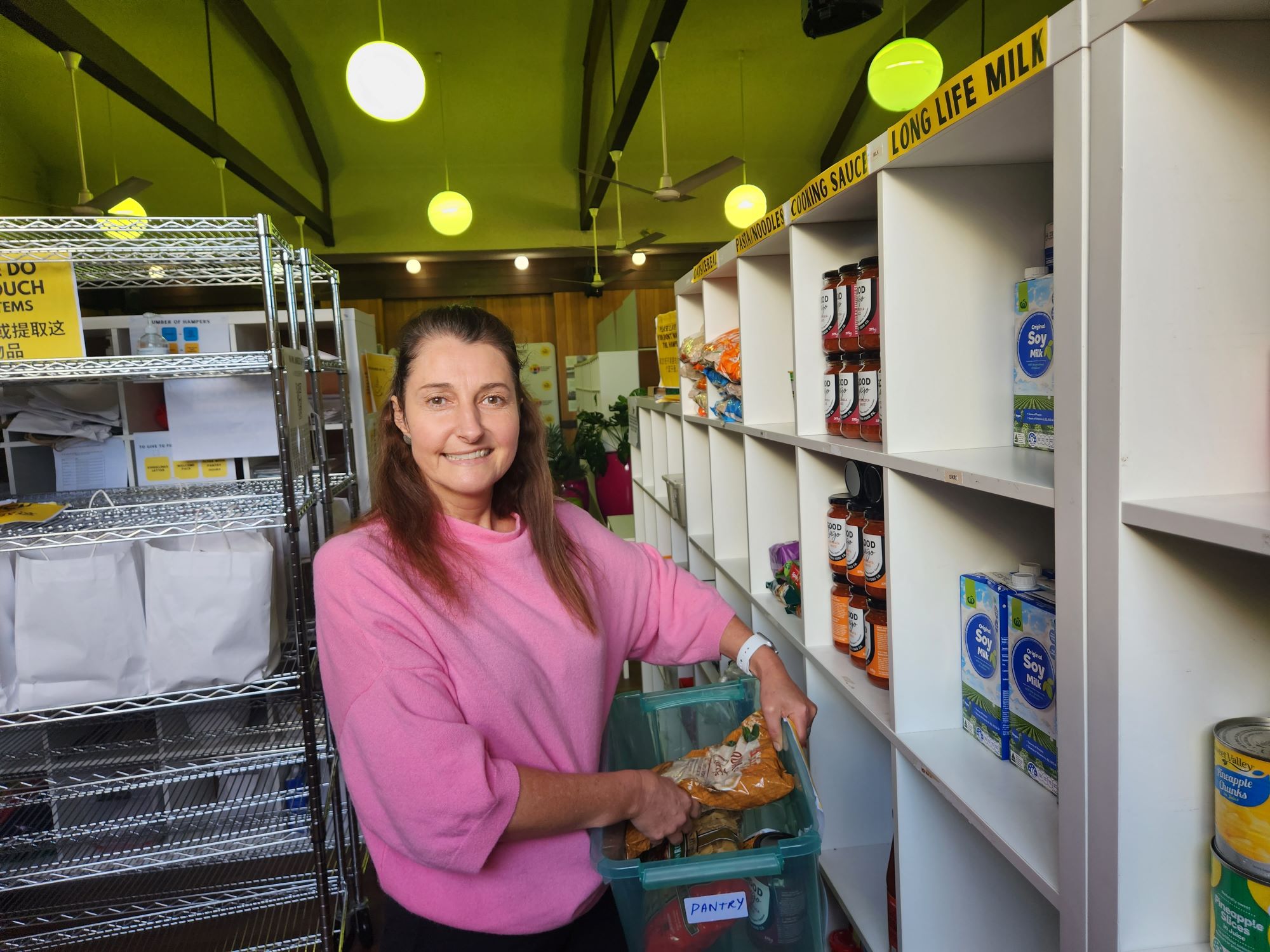
Unlike Streetheart and Food Not Bombs, The People’s Pantry has obtained grant funding over the years, which helps to subsidise food costs, but “it’s very ad hoc”, Alison explains.
“That might get us through the next couple of months, but after that we have to reapply and that’s very time-consuming. Regular support is something we’re lacking.”
Staff at SECC have failed to pin down and capture any grants that offer more than a few thousand dollars, despite repeated efforts. It means SECC still heavily depends on the goodwill of individuals and local small businesses who donate.
The question remains: how sustainable are these food relief projects?
In Sydney, the squeeze not only comes from inflation, which has climbed to levels not seen since the first Nintendo Game Boys hit the market.
The inundation of reports and studies pinpointing Sydney as the most expensive city in Australia for housing is significant enough to turn the city into an Atlantis. According to Demographia’s International Housing Affordability 2023 Edition, Sydney is the second least affordable city in the world for home purchasing. Domain’s June 2023 Rental Report shows that Sydney is the most expensive city in Australia for renters. Weekly rent for houses has increased 6.1 percent in the last quarter alone. For units, the rise was 8.1 percent.
In these claustrophobic circumstances, the pool of people able to donate, support and volunteer with grassroots organisations shrinks, while the ranks of those in need swell evermore.
Demand for council support
At the last Inner West Council meeting, the Labor majority blocked the motion put forward by Councillor Pauline Lockie and Councillor Dylan Griffiths advocating for direct funding for anti-poverty groups. They did so on the basis that it is not the role of local government to deliver such support.
“It is essential services, but it is not a public service,” said Deputy Mayor Philippa Scott at that meeting, “and this is not what our budget is designed to do.”
But all parties consulted in the writing of this article want to see more council involvement in anti-poverty campaigns and grassroots mutual aid programs.
Rik believes councils have the budget to dig deeper into their pockets. From his perspective, the city has “enough bicycle paths” and “sculptures”.
“We’ve got people there that need help, and they should be taken as the first priority over something that’s aesthetically pleasing.”
Rasmus says it was “a real bummer” to read about the Inner West Council’s decision to shirk responsibility for supporting food relief programs.
Kristen from the Antipoverty Centre expressed shock and disappointment over the Inner West Council’s decision, stating “it is perverse for governments to take public money and use it for advertising in some way when they could use the resources they have to help people directly.”
“It’s wasteful and it means they are outsourcing their responsibility to private individuals.”
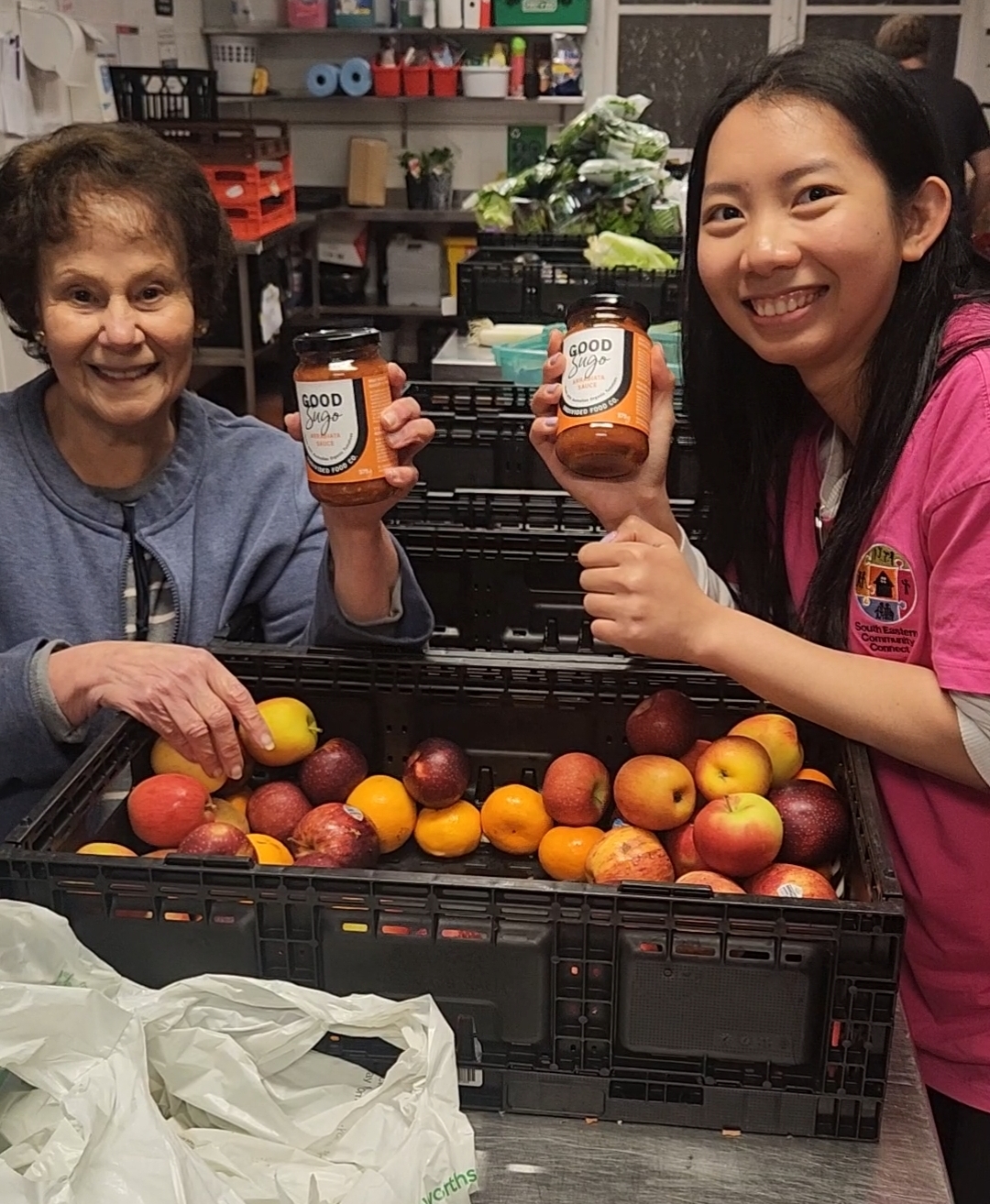
A different approach to food relief
There are no barriers to access when Streetheart roll up, and all the volunteers have some lived experience with the issues facing their regulars – rough-sleepers, impoverished old-age pensioners and domestic violence victims. Volunteers must also complete a mental health first aid course prior to working with Streetheart. It fosters an empathetic and respectful environment, Rik says.
“We don’t push religion. We don’t push politics. We’re just there to help. It’s as simple as that; every day blue collar people helping people in need. There’s no ulterior motive.”
By engaging with the homeless community on their turf, where they are most comfortable, Streetheart is able to offer specialised services, rather than the standardised food packages and support offered by run-of-the-mill non-profits. There is an emphasis on talking and listening.
“I’ve noticed a lot more homeless have pets; in particular, dogs,” Rik says.
As a result, Streetheart has partnered with the Animal Rescue Cooperative (ARC) who provide bags of dog food to the volunteer group.
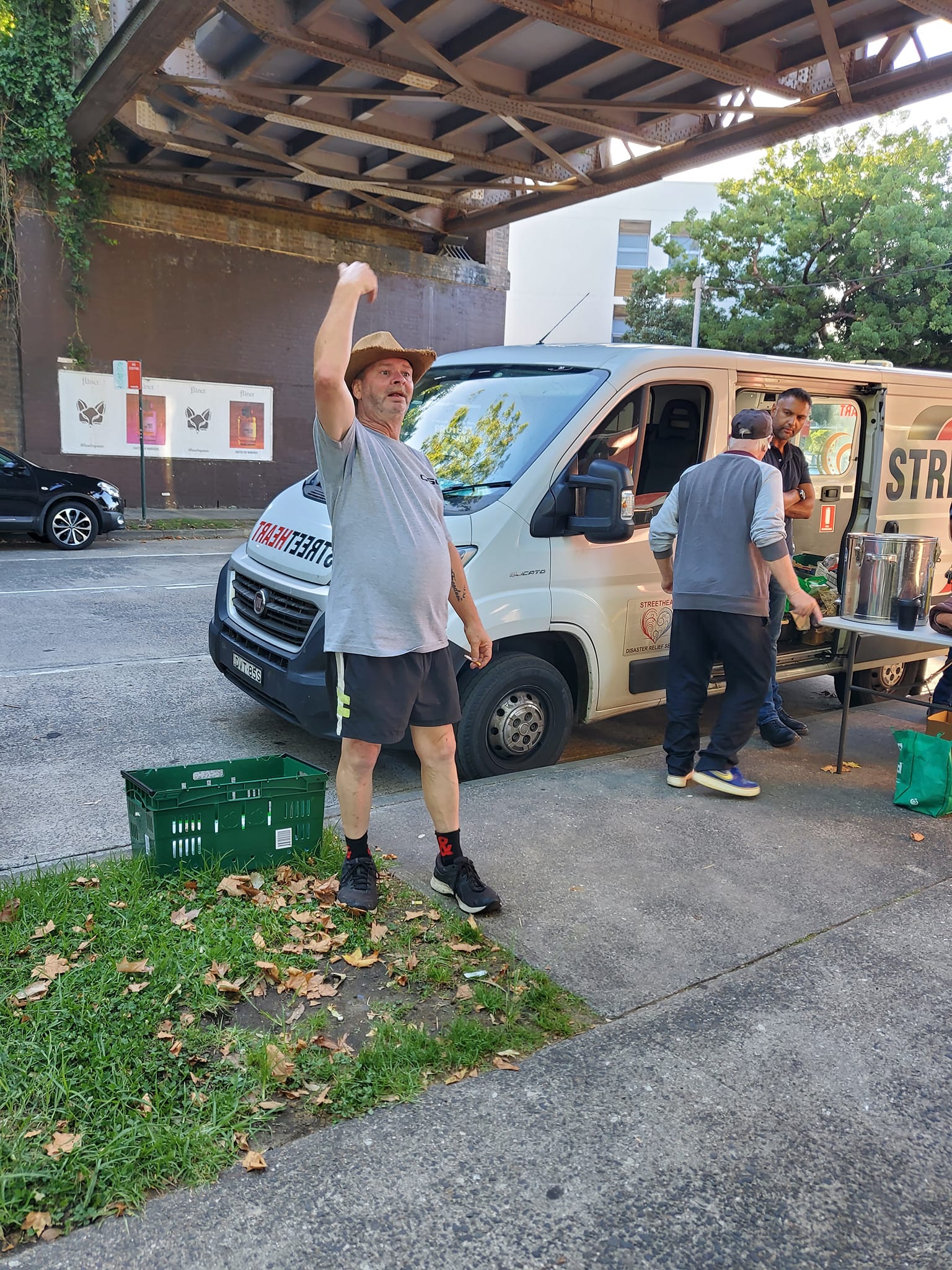
When the Sydney chapter of Food Not Bombs serves food in Newtown, they crucially do so without any conditions for access, just like Streetheart.
There is only one (self-imposed) food requirement: all the food is vegan. Non-violence is at the heart of what Food Not Bombs does, and taking a stand against the mistreatment of animals is an extension of that policy.
Rasmus explains that all the food is collected and rescued for free, meaning “there’s absolutely no money involved”. It’s a response to the oversupply of food waste – a point Lord Mayor Clover Moore highlighted during the last City of Sydney Council meeting.
In the City of Sydney LGA alone, food waste constitutes 14 percent of commercial waste and 35 percent of domestic trash. The motion put forward by the Lord Mayor demanded the Council redirect surplus food to those in need, thereby reducing emissions and ensuring more low-income residents and rough-sleepers can eat.
For Rasmus, it’s a familiar process. His Food Not Bombs affinity group have adapted to the issue like a pit-stop crew at a 24-hour endurance race.
He says they’ve secured food “in many different ways” in recent years. “In the past, we’ve been connected with a local IGA that would give us all the food that they were about to chuck out. We also dumpster dive.”
In addition to this, the group receives donations from various organisations with excess food. Mission Australia is one example.
Although the group has its roots in the global anti-war movement and anarchist politics, Rasmus says the group doesn’t push any political agenda to people taking food.
“People can grab food. They have no obligation to talk with us. We don’t start a conversation unless people start conversations with us.”
Only when people inquire will volunteers provide information about the group. Conversation may sometimes veer into politics thereafter.
“There’s no limit on how much food you can take either. We don’t tolerate people who discriminate against those who take a lot of food. We sometimes have some people who come up and they need to take a lot of food… We presume that they have a situation which they know more about than we do.”
Like Streetheart, Food Not Bombs receives no assistance from government – neither state nor local. It’s not a deal-breaker because Food Not Bombs is a decentralised network “operating outside of government”, Rasmus says. But that doesn’t mean the group is opposed to exterior help.
“Just because we are operating outside of those government bodies doesn’t mean we aren’t important or we can’t do with help.”
In fact, during times of national emergency, it is flexible grassroots mutual aid organisations, unbound by red tape and operating on an ad hoc basis, who have often responded the quickest. In the aftermath of the Lismore floods last year, a Melbourne-based group, Sikh Volunteers, attracted widespread praise for their disaster relief efforts. ‘Noted Legends Melb Sikhs Drove A Huge 34Hrs To Feed Flood-Affected Communities In NSW’, read the headlines.
Rik says that, during the COVID-19 pandemic, as people retreated indoors and avoided large gatherings, a lot of support services for the homeless disappeared off the streets. But Streetheart continued its work, following health guidelines closely.
During one lockdown, Rik wrote a letter to Lord Mayor Clover Moore, asking the City of Sydney Council to provide tents to rough-sleepers to enable them to isolate. It took two months for a Council representative to reply. The Council rejected the proposal on the basis that tents are a fire hazard, a notion Rik labels a “cop out”.
“I mean, sleeping bags are a fire hazard when you think about it,” Rik states. “I was really disappointed on that, although, in saying that, they did end up supplying swags, which did impress me. It came a bit later than I should have. But it did come.”
Rasmus makes a similar point. The work of Food Not Bombs in Sydney expanded significantly during the pandemic. The group continued to serve food while abiding by COVID safety procedures.
“I wish local councils took us more seriously,” Rasmus says, “in the sense that we are also essential should they fail. At times they [other food relief services] may not be as available.”
Rik says that Streetheart serve food every Friday night to rough-sleepers at Wentworth Park “regardless of public holidays and weather”. You’ll even find them there on Christmas, handing out gifts. Rik sees it as an opportunity “to let them know they’re not forgotten and not alone”.
“They’re going through enough as it is,” he pronounces.
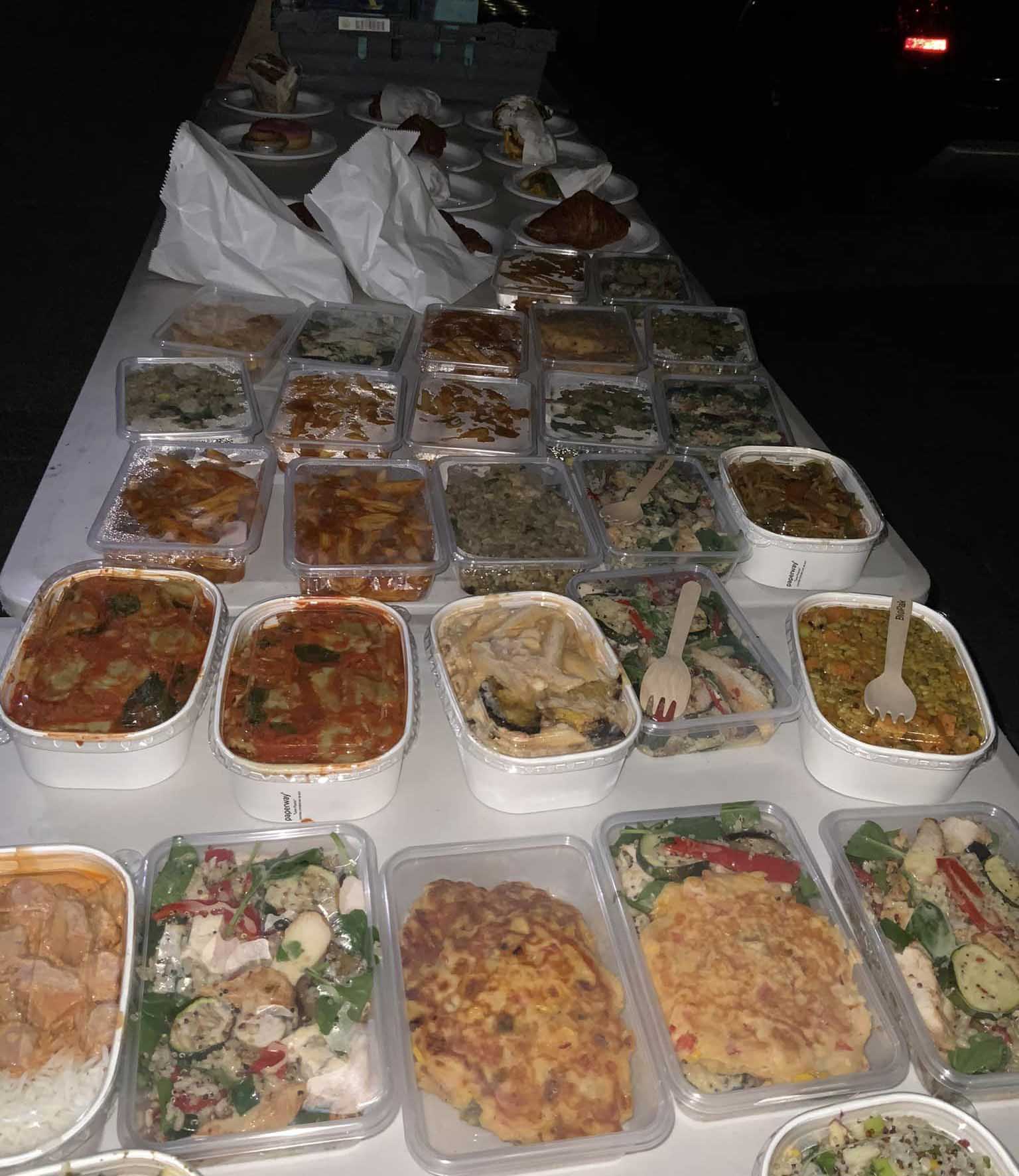
The new faces of food insecurity
Perhaps the most startling aspect of the cost-of-living crisis is that the impacts are ubiquitous. It’s a shadowy force, eerily close to home for many Sydneysiders, akin to a street corner lurker sizing up prey.
As Lord Mayor Clover Moore reported to the City of Sydney Council last month, employed people on low incomes have joined the queues of the hungry. Staff at Addison Road’s Camperdown Food Pantry have testified that their clientele has expanded. Nurses from the Royal Prince Alfred Hospital, facing stagnant wages, gentrification and inflation, are increasingly frequenting the food bank, for instance.
Signing off on the phone, Alison from the People’s Pantry gives an ominous warning.
“The face of food insecurity is changing,” she says. “It’s no longer people on benefits and single parents. It’s international students and people like you and me who have had a few bits of bad luck in their life.
“This crisis is affecting all of us, from all walks of life.”
